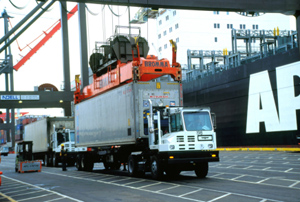Supreme Court Rules in ATA’s Favor on Los Angeles Port’s Parking, Placard Requirements

The Supreme Court ruled Thursday that the Port of Los Angeles cannot require trucking companies serving the port to display placards on trucks that have the proper permits and to submit parking plans before being allowed to operate, saying the rules violate federal law.
American Trucking Associations had filed a lawsuit against the plan saying it violated federal law.
“We are gratified that, at the conclusion of many years of litigation, the highest court in the land unanimously agreed with ATA on these rules. Our position has always been that the port’s attempt to regulate drayage operators – in ways that had nothing to do with its efforts to improve air quality at the port – was inconsistent with Congress’ command that the trucking industry be shaped by market forces, rather than an incompatible patchwork of state and local regulations,” American Trucking Associations President Bill Graves said.
“The decision is sure to send a signal to any other cities who may have been considering similar programs which would impermissibly regulate the port trucking industry,” he said.
The placards and parking plans, both part of the port’s concession agreements with trucking companies, are preempted by the Federal Aviation Administration Authorization Act, which prohibits regulation of a “price, route or service of any motor carrier.”
“When the government employs a coercive mechanism, available to no private party, it acts with the force and effect of law, whether or not it does so to turn a profit,” the court wrote in its unanimous opinion.
The port, which is an agency of the city of Los Angeles, had argued that it acted as a “market participant” in imposing the requirements, which would exempt it from the FAAAA’s prohibitions. But the court found that the enforcement of the rules did not qualify them for the market-participant exemption.
The concession agreement was part of the port’s clean trucks program, which aimed to reduce pollution from trucks serving the port.

